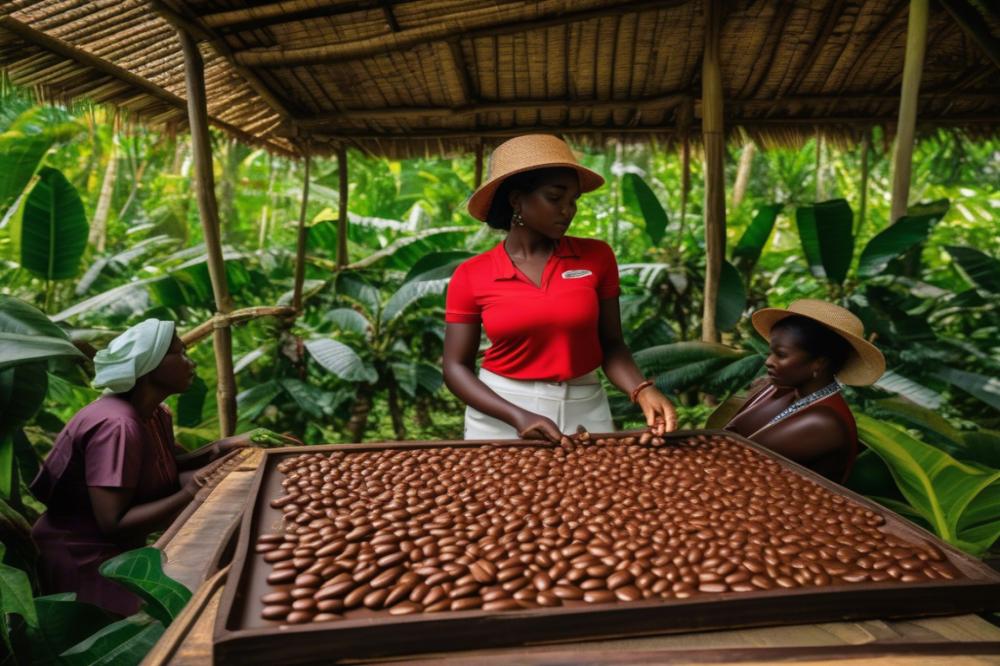Exploring the Role of women in chocolate Entrepreneurship
The chocolate industry is experiencing exciting trends and innovations. The rise of artisan chocolate is captivating consumers everywhere. More people are now interested in high-quality, ethically sourced products. Sustainability has become a buzzword, influencing how we think about cocoa farming. Many companies are shifting towards ethical sourcing and transparency in their supply chains.
In this vibrant landscape, it is vital to examine women’s roles in chocolate entrepreneurship. female entrepreneurs have made significant strides. They bring fresh perspectives and creative ideas to a traditionally male-dominated field. These women are not just participants; they are leaders who champion sustainability and ethical practices. Their empowerment through business development is essential for driving positive change in the industry.
Innovation is at the heart of what these women achieve. They often develop unique products that appeal to conscious consumers. By focusing on quality and integrity, they elevate the chocolate experience while promoting responsible practices. It’s inspiring to see how women in chocolate foster community connections and support local farmers. Their contributions shape not just businesses but also the future of cocoa farming and the chocolate market at large.
Understanding the impact of women in chocolate highlights the importance of diversity in leadership. Their role is crucial in encouraging others to pursue careers in this field. As more women take charge, the success of the chocolate industry can reach new heights. Exploring their journeys can inform future generations and inspire a more inclusive business environment.
Women in Chocolate

Historical context of women in the chocolate industry
Throughout history, women have played important roles in cocoa farming. In many cultures, they were often the heart of families that grew cocoa beans. Yet, their contributions were frequently overlooked. The chocolate industry has evolved significantly. For hundreds of years, women have navigated social and economic challenges in pursuit of business development. They have made artisan chocolate, driven by a passion for quality. This passion often translates into exceptional products that consumers appreciate.
Current statistics on women-owned chocolate businesses
Recent studies reveal a growing rise in female entrepreneurs within the chocolate industry. Approximately 50% of new chocolate ventures are led by women today. Many of these businesses focus on artisan chocolate creation. They embrace innovation and sustainability, providing ethically sourced products to their customers. Women lead these companies with a strong commitment to quality and ethical practices. This shift represents not just a trend, but a significant movement towards inclusion and representation in the industry.
The impact of female entrepreneurs on the chocolate industry
Female entrepreneurs are changing the game. They are driving improvements in cocoa farming methods. Through their leadership, they promote sustainability and ensure ethical sourcing. Their dedication empowers entire communities, inspiring women to take on leadership roles. By establishing strong brands, they carve out niches in a competitive marketplace. Additionally, these women often prioritize social responsibility in their business operations. This focus benefits not only their companies but also the communities involved in cocoa production. The impact is profound, reaching far beyond mere profits. It fosters a culture of respect, innovation, and empowerment within the realm of chocolate.
Women Leadership in chocolate entrepreneurship

Profiles of Notable Women Leaders in the Chocolate Sector
Many women leaders in the chocolate industry are making significant impacts. For instance, Odile Gilbert of Maison du Chocolat brings an artisan approach to her creations. Her unique flavor combinations have won numerous awards. Similarly, Sonia Johnson of ChocolaTas is known for championing ethical sourcing. She focuses on sustainability and empowers cocoa farmers around the world. These women not only create delicious treats but also inspire future generations in business.
Contributions of Women in Leadership Roles to Business Development
Women in leadership roles often bring fresh perspectives to business development. Their ability to innovate helps chocolate brands stand out in a competitive market. They focus on nurturing talent and fostering collaboration. Their leadership also promotes ethical practices, which resonate with conscious consumers. This commitment to sustainability enhances brand reputation and trust. When female entrepreneurs thrive, their successes benefit entire communities and economies.
Strategies Employed by Women Entrepreneurs to Overcome Challenges
Facing challenges is part of the journey for women in this field. Many use networking as a vital strategy. Building strong relationships can open doors and create opportunities. Others prioritize education, learning about the market and consumer trends. They adapt quickly when facing obstacles and rely on creativity. By focusing on community engagement, they strengthen their businesses and advocate for change. Resilience becomes a key asset in their entrepreneurial toolkit.
Sustainability and Ethical Sourcing

The role of women in promoting sustainability in cocoa farming is often overlooked. Female entrepreneurs have stepped forward, making significant strides in this vital area. They lead by example, showing how business practices can be environmentally friendly. Women leadership in the chocolate industry has proven to be a game-changer. These women focus on sustainable methods that protect both the planet and their communities.
When it comes to ethical sourcing, the importance cannot be overstated. Consumers today want to know where their chocolate comes from. They are looking for transparency in the chocolate industry. Female-led businesses frequently advocate for fair trade practices. Their efforts help ensure that farmers receive fair wages, resulting in better livelihoods. This empowerment breeds a sense of responsibility among producers and consumers alike.
Innovative Initiatives
Case studies reveal inspiring examples of women-led initiatives prioritizing sustainable practices. One such project involved a group of female cocoa farmers in Ghana. They adopted agroforestry techniques, integrating trees into their cocoa farms. This approach not only improved biodiversity but also increased crop yield. In addition, the women benefited from training in business development. Their impact on the local economy was remarkable.
Another example comes from a female entrepreneur in South America. She started an artisan chocolate company that sources cocoa directly from local farms. By partnering with these farmers, she ensures that ethical sourcing is the heartbeat of her business. The innovation does not stop at just the product. She created a program to educate young women about sustainable farming. Investing in education empowers the next generation to continue this important work.
The influence of women in chocolate entrepreneurship highlights a profound truth. Achieving sustainability in cocoa farming requires collaboration at every level. The initiatives led by women inspire others and contribute to a larger movement. They show how eco-friendly practices can create delicious chocolate while caring for our planet. Their dedication serves as a powerful reminder of the potential for positive change.
Innovation in Artisan Chocolate
Female entrepreneurs are making significant strides in the chocolate industry. Their innovative approaches to chocolate creation are changing how we view this beloved treat. By focusing on quality and distinct flavors, these business leaders set new standards that many now follow.
Women leadership in artisan chocolate often emphasizes sustainability. Many female-led businesses prioritize ethical sourcing of cocoa. This commitment to sustainability resonates with consumers who care about the environment and social responsibility. Chocolates crafted from responsibly farmed cocoa not only taste better, but they also support local communities.
Research and development play a crucial role in enhancing product quality. Women in the chocolate sector frequently use science to experiment with various ingredients. They explore unique flavor combinations that push the boundaries of traditional chocolate. The creativity displayed in these small batch productions is remarkable. Such innovation draws in customers who are eager to try something new.
The trends in artisan chocolate are greatly shaped by women in chocolate entrepreneurship. As they enter the market, they often introduce fresh ideas. This might include incorporating local ingredients or experimenting with different processes that highlight the cocoa’s natural flavor. Each new venture promotes diversity in offerings, appealing to wide-ranging preferences.
Empowerment of women in this field is also instrumental. As they rise in prominence, they inspire future generations of chocolate makers. Their stories highlight the potential of female leadership in business development, encouraging others to follow suit. Seeing successful women can motivate aspiring chocolatiers to turn their dreams into reality.
The impact of female entrepreneurs in the chocolate industry is profound. They influence both the market’s direction and consumer expectations. With their innovative thinking, these women create chocolates that are not only delicious but also reflect ethical practices. This shift in focus changes perceptions about what artisan chocolate can and should be.
Empowerment through Chocolate Entrepreneurship
Owning a chocolate business offers empowerment for female entrepreneurs around the globe. It allows women to take charge of their financial futures and create positive change in their communities. Through the chocolate industry, they can express creativity while promoting ethical sourcing. This path encourages women leadership in areas often dominated by men.
Numerous programs and organizations support these ambitious women. Initiatives focusing on business development specifically target women in cocoa farming. They provide essential training and resources for skills enhancement. With support from these organizations, female chocolatiers can refine their craft and embrace innovation. Many workshops highlight the importance of sustainability, teaching participants how to combine business success with environmental stewardship.
Success Stories
Inspiring success stories emerge from women transforming their communities through chocolate. One such entrepreneur began her journey in a small village. After learning the art of artisan chocolate making, she started her own business. This venture not only improved her family’s living conditions, but also provided jobs for local women. This ripple effect showcases how chocolate can bring about economic growth.
Another remarkable story is of a woman who realized the potential of organic cocoa farming. By focusing on sustainability, she created a premium chocolate brand. Her company champions ethical sourcing practices and gives back to local farmers. Besides generating income, her business fosters community development. The impact is profound; her efforts have empowered countless women and bolstered their independence.
These examples illustrate how women in chocolate entrepreneurship drive progress. They challenge stereotypes and break barriers. Engaging with the chocolate industry opens doors for more women to join. When empowered, they can change lives. This movement illustrates that the sweet paths of chocolate can lead to significant transformations.
Final Thoughts
The contribution of women in chocolate entrepreneurship is significant and transformative. They bring fresh ideas and creativity to the chocolate industry, crafting products that stand out and captivate consumers. Female entrepreneurs have demonstrated resilience and innovation. Their impact goes beyond just making chocolate; it inspires communities and shapes ethical practices. With every bar or bonbon, these women tell stories of heritage and sustainability.
Looking forward, the outlook for women in this field appears promising. As interest in artisan and ethically sourced chocolate rises, female-led businesses are gaining traction. Younger generations are eager to support brands that empower women and prioritize fairness. This shift creates a fertile ground for aspiring chocolatiers to thrive. With increased access to resources and mentorship, these entrepreneurs will likely continue to flourish.
It’s crucial to champion initiatives led by women. Supporting their ventures means endorsing diverse voices in the chocolate industry. This is not just a female issue; it’s a community issue. Everyone benefits when women have equal opportunities. So, let’s celebrate their achievements and invest in their dreams. By doing so, we help create a more equitable and delicious future for all. The sweet world of chocolate should reflect all its makers, and that includes empowering those who have been historically underrepresented.



